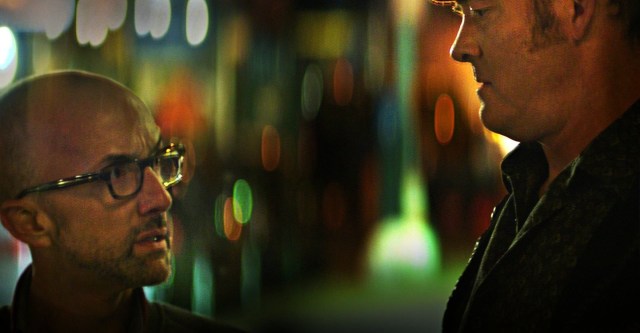
Chatty, self-absorbed, streetwise and sex obsessed, even if he wasn’t drawing his quintessential “New York types,” we’d call Jules Feiffer’s characters “cartoons.”
They’re intellectuals on the pseudo-intellectual end of the scale, funny in biting, verbose flashes of self-realization. As in “maybe I’m not as smart as I thought.”
A classic Feiffer gag that turns up in his script for “Bernard and Huey,” the new film based on two of his most famous New Yorkers. Bernard is on the phone (in a flashback), trying to talk a woman the womanizer Huey once set him up with into going out with him.
“There’s a new French film screening — ‘Shoah.’ I don’t know anything about it, but…sounds like a muuuuuuusical!”
Get it? If not, there, I saved you the trouble of watching this or for that matter reading on.
Feiffer’s grand Hollywood statement, filmed in the 1970s, was “Carnal Knowledge,” a coarse and almost-comical sad-faced male wish fulfillment fantasy, and “Bernard and Huey” has something of that about it. It’s a biting midlife crisis dramedy about two old friends who reconnect after 25 years and struggle to settle back into the dynamic that used to rule their relationship.
Back in the ’80s, Huey (Jake O’Connor) was an omnivorous sexual adventurer, in pursuit of any and all women, but especially New York “urban” women.
“The urban chick is trained for combat…If I had any respect for girls, I’d NEVER make out.”
Bernard (Jay Renshaw) was his bespectacled, already-balding poet-pal, fretting over “not progressing” in his life — at 25. He needs Huey’s little black book to have a prayer of getting a date in the cold, cruel city.
Twenty-five years later, Bernard (Jim Rash) is divorced, living in a permanently-unfurnished apartment and a mid-level functionary at a publishing house. Poetry is out the window, with the rest of his hair. But he’s now attractive to stewardesses (Remember, “male wish fulfillment fantasy.”) and has a beautiful, age-appropriate on-and-off lover (Sasha Alexander of “Rissoli & Isles”), a psychotherapist willing to celebrate “ten years since we started breaking up with each other.”
Then Huey shows up — wealthy, lost, “fat bald and old and…defeated.” Naturally, he’s played by David Koechner, the character actor best built for coarse, comically embittered and lovelorn.
They’re hurled back into each other’s lives, and even if you don’t live in New York, you know how this is supposed to go. At least one of them tries to ignore the intervening years and slip them back into their old power dynamic.
That would be Huey, who just “escaped” from Zelda (Mae Whitman), his shrill, man-hating failing graphic novelist daughter. He abandoned her at 10, so she has her reasons. Huey still has the patter, if not the looks and gruff charm of a “challenge” worth taking on — for a woman.
To hear Koechner’s Huey go off and the “80s chicks” and the city he misses (chasing away the stewardesses Bernard has mysteriously lured to their table) is to hear misogynistic, faintly homophobic slam poetry. He cooly rants about the “no frills mean…the mean queers” who wait on you in every store and restaurant, “meanness of a higher sphere” that New York is infamous for. He clears the room.
The situations involve coupling and uncoupling, an old flame (Nancy Travis) and ex-wife (Bellamy Young of “Scandal”) and strained efforts to “right” this universe by putting these old friends back in their former places.

The casting is spot-on, and one other decision by director Dan Mirvish pays dividends. He has the leads talk in duologues – each muttering narcissistic musings about “MY problems” while the other is talking about is. Occasionally, their topics of interest intersect and they switch the duologue to dialogue.
Huey and Bernard’s flashbacks are where the film gives us flashbacks to the Oscar (for a 1961 animated short, “Munro”) and Pulitzer prize-winning cartoonist, satirist and playwright’s sweet-spot — young guys, sitting in a bar, in an apartment, guys at their most sexist. Be brusque to women you want to pick up, was Huey’s counsel way back when — “Never ask a personal question, never pick up a check.”
He never grew out of that.
“I’m NOT sleeping with you, Huey.”
“Yeah, but 20 years ago you would have. Yeah, you would!”
His daughter? “She treats men just like you treat women,” and yes, that’s fascinating to watch.
As much as I enjoy “faintly repulsive,” like New Yorkers themselves, the movie’s a bit exhausting to be around, even at 90 minutes. All these self-absorbed “types” (even peripheral characters), self-conscious swipes at “hipsters,” self-inflating references to “Shoah” and Bukowski and August Wilson and Tom Stoppard, Black Flag and The Circle Jerks.
That’s a Woody Allen crutch, drop a lot of names and titles to give the script and screenwriter the veneer of cultural currency and seriousness. Not buying it.
This is just two aged sexual opportunists struggling to prolong the fantasy, an anti #MetToo moment that slyly asks, “What will 50ish lechers do when twentysomething young women stop using them to advance their careers?” The jury’s still out on that one, and it may be pure Feiffer nostalgia to go there, but props for still having the guts to ask the question.

MPAA Rating: unrated, sexuality, profanity
Cast: David Koechner, Jim Rash, Mae Whitman, Sasha Alexander, Nancy Travis, Bellamy Young, Richard Kind
Credits:Directed by Dan Mirvish, script by Jules Feiffer . A Freestyle release.
Running time: 1:31
